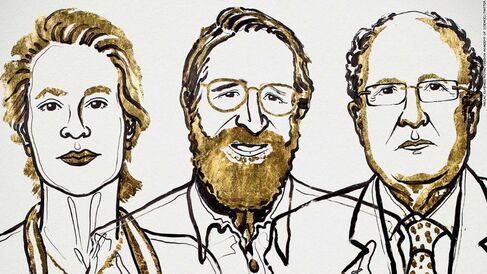
Professor Sir Greg Winter, of the University of Cambridge, has been jointly awarded the 2018 Nobel Prize in Chemistry along with Frances Arnold and George Smith for his pioneering work in using phage display for the directed evolution of antibodies, with the aim of producing new pharmaceuticals.
It came as a bit of a shock, and I felt a bit numb for a while. It's almost like you're in a different universe.
Greg Winter
The first pharmaceutical based on this method, adalimumab, was approved in 2002 and is used for rheumatoid arthritis, psoriasis and inflammatory bowel diseases. Since then, phage display has produced antibodies that can neutralise toxins, counteract autoimmune diseases and cure metastatic cancer.
The Royal Swedish Academy of Sciences announced the 2018 Prize this morning with one half to Frances H. Arnold and the other half jointly to George P. Smith and Sir Gregory P. Winter.
Professor Winter, the Master of Trinity College, is a genetic engineer and is best known for his research and inventions relating to humanised and human therapeutic antibodies. Sir Gregory is a graduate of Trinity College and was a Senior Research Fellow before becoming Master.
His research career has been based almost entirely in Cambridge at the Medical Research Council’s Laboratory of Molecular Biology and the Centre for Protein Engineering, and during this time he also founded three Cambridge biotech companies based on his inventions: Cambridge Antibody Technology (acquired by AstraZeneca), Domantis (acquired by GlaxoSmithKline) and Bicycle Therapeutics.
Professor Winter becomes the 107th Affiliate of Cambridge to be awarded a Nobel Prize. Born in 1951 in Leicester, Sir Greg studied Natural Sciences at Trinity College, Cambridge, and was awarded his PhD, also from Cambridge, in 1977.
Professor Patrick Maxwell, Regius Professor of Physic and Head of the School of Clinical Medicine at the University of Cambridge, said:
“I am absolutely delighted that Sir Greg’s work has been recognised with a Nobel Prize. The work for which the prize is awarded was carried out on the Cambridge Biomedical Campus. It directly led to the power of monoclonal antibodies being harnessed for treatment of disease. Medicines based on Sir Greg’s discovery have transformed the lives of patients around the world. His inventions really have produced silver bullets that have transformed the way medicine is practised.” - Patrick Maxwell
Frances H. Arnold, who also shared today's Prize, conducted the first directed evolution of enzymes, which are proteins that catalyse chemical reactions. Since then, she has refined the methods that are now routinely used to develop new catalysts. The uses of Frances Arnold’s enzymes include more environmentally friendly manufacturing of chemical substances, such as pharmaceuticals, and the production of renewable fuels for a greener transport sector.
In 1985, George Smith developed an elegant method known as phage display, where a bacteriophage – a virus that infects bacteria – can be used to evolve new proteins.
You can read more about the 2018 Nobel Prize in Chemistry here: https://www.nobelprize.org/uploads/2018/10/popular-chemistryprize2018.pdf
The text in this work is licensed under a Creative Commons Attribution 4.0 International License
